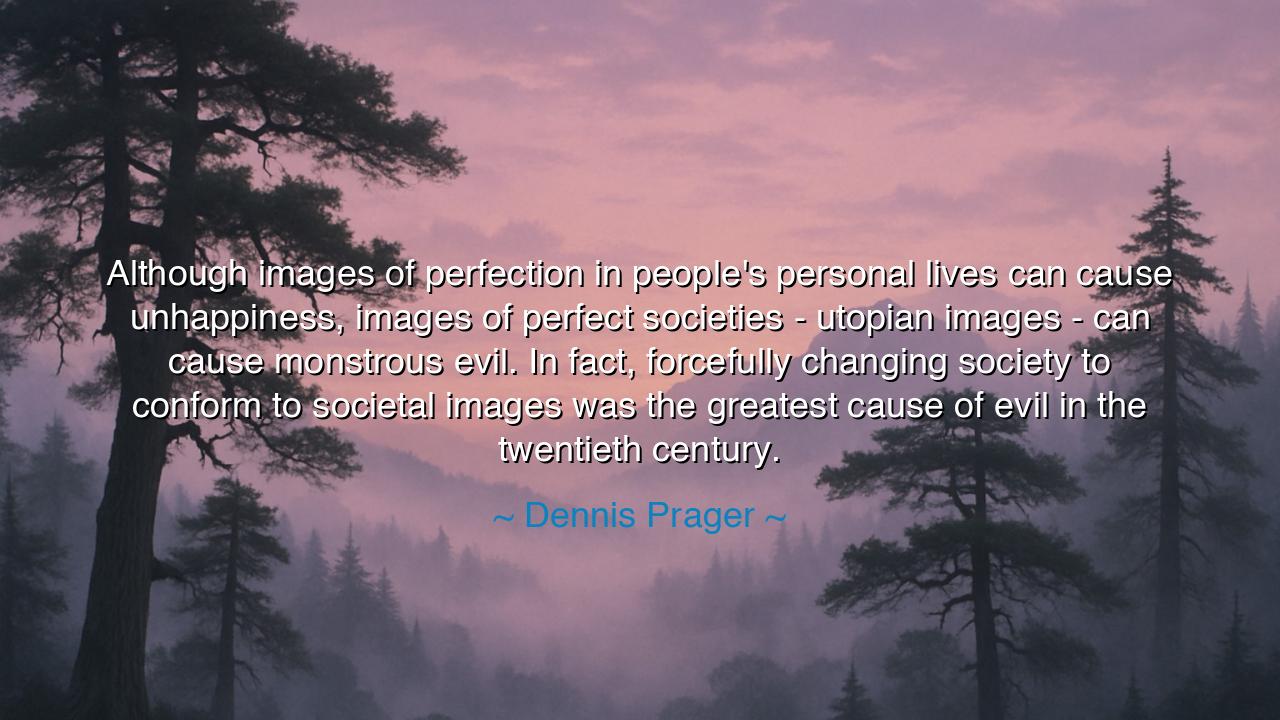
Although images of perfection in people's personal lives can
Although images of perfection in people's personal lives can cause unhappiness, images of perfect societies - utopian images - can cause monstrous evil. In fact, forcefully changing society to conform to societal images was the greatest cause of evil in the twentieth century.






The moral teacher Dennis Prager spoke these solemn and weighty words: “Although images of perfection in people's personal lives can cause unhappiness, images of perfect societies—utopian images—can cause monstrous evil. In fact, forcefully changing society to conform to societal images was the greatest cause of evil in the twentieth century.” In this teaching lies a warning, grave and urgent: that the pursuit of perfection, when twisted by pride and force, becomes a weapon of destruction. What begins as a dream of paradise may, when imposed by power, descend into hell.
To long for perfection in one’s personal life may breed restlessness, envy, or despair, for no man is flawless, no life without sorrow. Yet the damage is mostly confined to the heart of the one who suffers. But when men turn their eyes outward and demand that all of society bow to a single vision of utopia, the danger multiplies a thousandfold. For then liberty is crushed beneath ideology, diversity is scorned as corruption, and dissent is branded as treason. In such soil, the seeds of tyranny grow swiftly.
History shouts the truth of Prager’s words. Recall the Communist revolutions of the twentieth century, which promised heaven on earth: equality, justice, a world without poverty. Yet in forcing nations to conform to this imagined perfection, rivers of blood were shed. Tens of millions perished in gulags, purges, and famines—not because their rulers lacked vision, but because they sought to impose perfection by crushing human freedom. The dream of utopia became the nightmare of tyranny.
So too in the rise of Nazi Germany, where the pursuit of a “perfect race” led to one of the greatest evils mankind has known. What was promised as a purified and glorious society became a machinery of death, consuming the innocent in the name of an impossible vision. Here, the lust for a flawless society birthed horrors that scar the memory of humanity forever. Prager’s words remind us that the twentieth century’s greatest evil was not born of men seeking wealth or power alone, but of men demanding that the world bow to their utopian images.
The wisdom here is fiery and clear: society cannot be forced into perfection without betraying its humanity. True progress is slow, humble, imperfect—woven from freedom, compassion, and the acceptance of human frailty. When rulers, ideologues, or zealots demand total conformity to an imagined paradise, they lay the foundation not for heaven, but for cruelty. A society is not a garden to be sculpted into symmetry by force; it is a forest, wild and diverse, that thrives through freedom.
The lesson for us is sharp: resist the temptation of false utopias. Do not trust those who promise a flawless world if only freedom is surrendered. Remember that imperfection is not a curse but a truth of human life, and it is in working patiently with our flaws that true goodness grows. As individuals, seek virtue, not perfection; as societies, seek justice and liberty, not the crushing idol of a perfect order.
Practical wisdom flows: cultivate humility in your vision of the world. Work to improve what is within your reach, but do not dream of bending all men to one ideal. Protect freedom of thought, guard diversity of voice, and remember that the dignity of a society lies not in its uniformity but in its capacity for mercy and restraint. Be wary of leaders who promise paradise at the cost of freedom, for history shows that their paradise ends in chains.
So let Prager’s words be inscribed upon your heart: “Utopian images can cause monstrous evil.” Cherish freedom above perfection, humility above pride, patience above force. For the societies that endure are not those that seek to erase imperfection, but those that embrace humanity as it is—flawed, yet capable of goodness when guided by truth and love.






AAdministratorAdministrator
Welcome, honored guests. Please leave a comment, we will respond soon